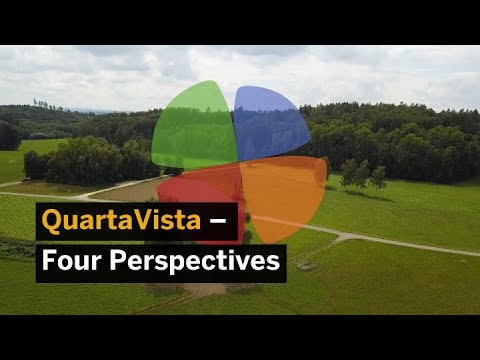Across the globe, people are taking to the streets demanding climate action. Consumers are becoming more deliberate in their purchase decisions and politicians are taking measures like the European Green Deal and the United Nations Sustainable Development Goals (UN SDGs).
The winds of change are blowing through the financial world too. One prominent example is Larry Fink, CEO of investment management company Blackrock, who said in his 2020 letter to shareholders that “climate risk is investment risk.”
Businesses, too, are expected to operate more sustainably. So far, however, expressing sustainability successes in monetary terms — in the balance sheet — has not been easy. Enter QuartaVista, an innovation project led by SAP and funded by the German Federal Ministry of Labor and Social Affairs.
“The idea behind QuartaVista is to measure corporate success not only in financial terms, but to integrate other dimensions in the balance sheet, such as ecology, knowledge, and society,” says Reiner Bildmayer, QuartaVista project manager at SAP.
The project ran from November 2018 to February 2021 and recently presented its results at a closing event in Berlin.

Video by Angela Klose
Pioneer Work
The QuartaVista methodology was jointly developed by SAP and Regionalwert AG, Freiburg, a citizen shareholder company that channels citizens’ money to build up regional sustainable enterprises. What’s new about QuartaVista is that sustainable business practices, as well as risks, are shown on the assets or the liabilities side of the balance sheet.
The first prerequisite for this was to translate sustainability efforts into quantifiable metrics.
“Within the project, we developed 180 sustainability KPIs, thus creating the basis to capture these values in the balance sheet,” explains Christian Hiss, founder and CEO of Regionalwert AG, Freiburg.
One example is knowledge retention. According to the QuartaVista methodology, training new employees does not only incur costs to the company. Instead, the knowledge that is built up and retained can be booked as an asset in the balance sheet.
The partners involved in the QuartaVista project were seed producer Bingenheimer Saatgut, organic food wholesaler BODAN, organic grain product manufacturer Bohlsener Mühle, and Regionalwert AG Freiburg. They tested the methodology in practice. SAP’s role was to map the QuartaVista accounting approach to a dashboard. In addition, Cognostics, an artificial intelligence-enhanced software specialist and the charitable research and teaching organization Parmenides Foundation visualized the KPIs in a forecast tool.
“QuartaVista has built a prototype that demonstrates how sustainability KPIs can be integrated in the accounting process and in corporate management as well,” says Annika Woltjen, QuartaVista project lead at BODAN.
“We broke it down into the smallest details, which is what ultimately sets this project apart,” Bildmayer shares.
Holistic corporate management involves combining financial and non-financial key figures, adds Martin Heinig, head of New Ventures and Technologies at SAP, at the event in Berlin. “You have to collect the data, make it assessable and comparable. In this respect, QuartaVista has taken a big step in the right direction.”
True Prices
One example of how QuartaVista might play out in practice is prices.
“QuartaVista gives us the opportunity to reach true prices,” stresses Philip Luthardt, sustainability manager at Bohlsener Muehle. “It is a chance for producers of organic products to show how much value we add to society as a whole.”
Isabelle Sanchez, commercial manager at Bingenheimer Saatgut, believes that price transparency helps to drive customer acceptance: “When we explain the values we are creating and what goes into the product, then consumers are more likely to agree.” As an example, she cites organically created seedfast varieties, whose seeds spawn the same plants repeatedly. This saves consumers from having to buy new seeds in the following year.
“What is cheap today is expensive tomorrow,” explains Jenny Lay-Kumar, QuartaVista project lead at Regionalwert AG, Freiburg. “Adding risks and damage to the balance sheet, as well as crediting efforts toward sustainability, means much more than just making products more expensive. It means realigning the market economy based on a new way of measuring success.”
QuartaVista does not necessarily mean making organically produced products more expensive. “Sustainable management is an investment that is capitalized as an asset in the balance sheet. If QuartaVista is implemented, I can achieve completely different prices,” Hiss concludes.
Experimentation and Thinking Space
Even though the project has now officially concluded, it is not the end of the line, but rather a starting point. The partners are determined to drive their methodology forward in collaboration with businesses, academia, and politicians. A lot of work remains to be done; the project was set up as an experimentation and thinking space.
“We have a tool with which we can practice thinking. We can do something and see the results of our actions. This is the beginning of a larger change, not only in finance,” Professor Karin Graeslund from the Wiesbaden Business School and German-speaking SAP User Group DSAG, said at the closing event.
“We opened up a wealth of potential with QuartaVista. We are determined to continue,” Bildmayer emphasizes.
QuartaVista and the “New Quality of Work Initiative”
“QuartaVista – Navigation system for value orientated companies” is one of 17 projects initiated by the “New Quality of Work Initiative”, with interdisciplinary experimental spaces funded by the German Federal Ministry of Labor and Social Affairs. Term: November 2018 – February 2021.



